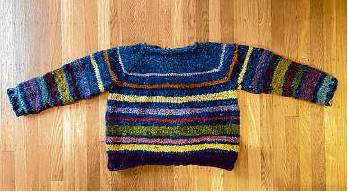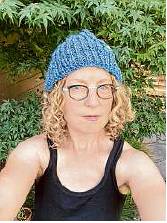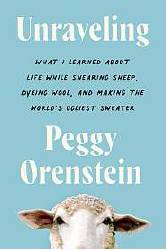BOOKS
Berkeley author’s tale ‘Unraveling’ may leave you in stitches
By L.A. Taggart
Berkeley writer Peggy Oren-stein was on a national book tour to promote her bestseller “Boys & Sex” when the pandemic paused her full-speed career. As an anxiety alleviator, she turned to knitting, a longtime hobby, and (maybe due to stir-craziness) resolved to produce a sweater by her own hands from shearing to spinning to crafting. She saw all the sourdough bakers and raised them a hair shirt.
The result is a larger-than-expected journey detailed in her new book, “Unraveling: What I Learned About Life While Shearing Sheep, Dyeing Wool, and Making the World’s Ugliest Sweater.” It’s a funny, well-researched, personal story about the value of fabric, women’s work and local connections.
Orenstein’s ambition to “make a garment from scratch” starts at a regenerative ranch in Sonoma County where she, in the workout of a lifetime, shears Martha, a Wensleydale-sired ewe — leaving with a trash bag full of fresh fleece and one slightly shortened finger.
That’s just the start: Oren-stein washes the fiber of lanolin and “swarf” (dirty bits), “cards” (combs) it, “drafts” it into thread, and pairs threads into two-ply yarn. She assembles skeins to “thwack,” hangs them to set the “twist,” and “mordants” the fiber by soaking it in dissolved metals and salt. She still needs to dye it, create a design, and then she can — finally! — start knitting.
Starting down this sweater-making thread, Orenstein unravels a whole ball of yarns. She considers the enduring and cross-cultural myths of women weavers, variously goddesses or witches; she celebrates the unsung and history-altering inventions of thread and the spinning wheel; she documents the ways early American spinners, mostly teenage girls, were labor rights pioneers.
Turns out fabric facts can be fascinating: Outfitting a Viking ship required about 1,140 miles of yarn, which would take one woman about 10 years to spin. Before synthetic dyes, the English royal family colored their regal purple cloaks from the mucus of sea snails. Microfiber “fleece” sheds nondegradable plastic filaments that pollute waterways, amounting to the equivalent of 50 billion plastic bottles a year.
Orenstein counters some of the heaviness of wildfire, climate destruction and the global health crisis with her humor: Wearing her polyester fleece half-zip to her first sheep shearing was like brandishing a ham and cheese sandwich at a bat mitzvah, she writes.
Despite the difficulty of arranging hands-on instruction during the shutdown, Orenstein is tenacious and resourceful in her quest. Most of her sources are local, from the sheep ranch in the North Bay to an Oakland seed-grower (for natural dyes) and multiple East Bay yarn shops.
Ultimately Orenstein produces something wearable, describing it as the “world’s ugliest sweater” — but that is doing it a disservice. By book’s end, the reader is ready to identify deep, intrinsic beauty in anything that difficult to create. You just may need to read the book to see that.
L.A. Taggart lives in Silicon Valley and contributes frequently to The Chronicle’s books coverage.


